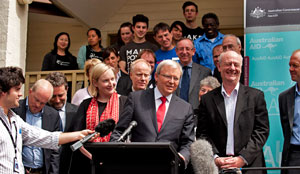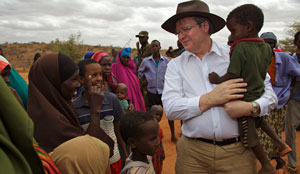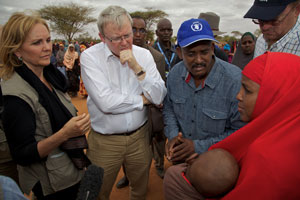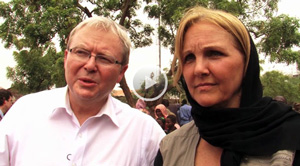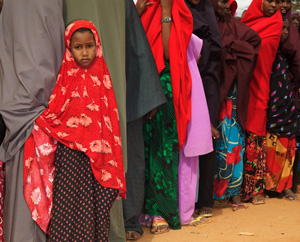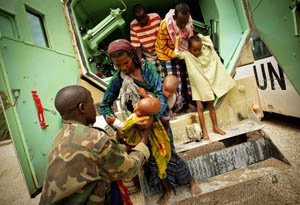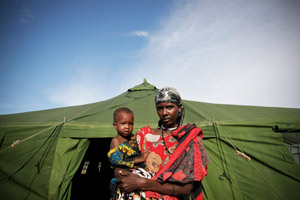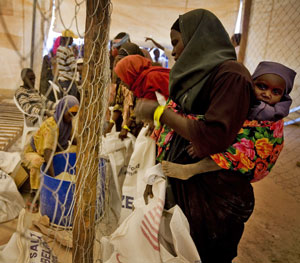Updated December 2011: The Australian Government is extremely concerned about the escalating humanitarian crisis in the Horn of Africa, especially the famine in parts of southern Somalia. More than 13 million people in Djibouti, Ethiopia, Kenya and Somalia are in urgent need of food and humanitarian aid because of consecutive droughts, following two poor rain seasons.
The United Nations has launched a $2.48 billion international emergency appeal in response to the crisis.
The Australian Government responded rapidly to the emerging crisis with funding for urgently needed food rations, health support and shelter to help the most vulnerable people in the Horn of Africa affected by the crisis.
Australia's total funding in response to the drought and famine in the Horn of Africa now stands at $128 million - including $98 million in humanitarian assistance and $30 million for the region's long-term food security.
Australia is closely monitoring the humanitarian situation and is working with partners on the ground to best assess how Australia can continue to support the region.
On 24 July, Minister Rudd travelled to the Ethiopia and Somalia border areas with World Food Programme Executive Director Josette Sheeran to underline the absolute importance of a coordinated global response to the unfolding humanitarian crisis.
According to the UN Financial Tracking Service, Australia is currently the world's fifth largest country donor to the Horn of Africa, having provided $98.2 million in humanitarian funding, including:
Emergency food rations and nutritional support through the World Food Programme (WFP) ($57 million)
WFP is the world's largest humanitarian agency fighting hunger worldwide. WFP is extending operations to feed almost 11 million drought affected people in the Horn of Africa. In Somalia WFP has provided nearly one million people with life-saving food assistance and plans to reach a further 900,000 in the coming months. WFP is also providing assistance to drought affected populations in Ethiopia and Kenya.
Emergency shelter and protection for women and children in refugee camps through the United Nations High Commissioner for Refugees (UNHCR) ($15 million)
The UNHCR is providing immediate life-saving assistance and humanitarian aid in places where people have remained in their communities or where people have fled to seek help in other countries. They aim to reach as many people as possible and reduce the need for cross-border movement.
UNHCR has started the distribution of emergency assistance packages that consist of core relief items, such as jerry cans, buckets, pots, plates and other utensils which allow people to prepare and store safely the water and food they received from WFP and others. The packages also include high-energy biscuits, oral re-hydration salts and water purification tablets. In Somalia, UNHCR and its partners have distributed emergency assistance packages to more than 280,000 people since July 2011.
Supporting the urgent health and nutrition needs of women and children across Somalia through UNICEF ($10 million)
UNICEF is leading the humanitarian response for nutrition and water, sanitation and hygiene (WASH); and is co-leading the response on education and child protection. Australian assistance through UNICEF will provide: treatment for severely malnourished children, supplementary feeding, immunisations for measles, and upgrading of water and sanitation facilities and hygiene promotion at refugee camps, transit sites, and host communities. Australia's assistance to UNICEF is also covering education and child protection activities, including establishing Child Friendly Spaces and primary schools in refugee camps and neighbouring communities.
Food and nutrition assistance and water and sanitation services through Australian non-government organisations ($6.2 million)
AusAID has activated the Humanitarian Partnership Agreement (HPA), the formal mechanism for engagement between AusAID and six pre-qualified Australian NGOs (Caritas, CARE, Oxfam, PLAN International, Save the Children and World Vision) in humanitarian emergency responses. The mechanism provides fast funding to the NGOs, who are best-placed to respond quickly and effectively. To complement Australia's funding to the UNHCR for assistance to people living in refugee camps, all of the NGO assistance will be provided to people still struggling with the drought in their own communities. These NGOs have Australians on the ground in Ethiopia and Kenya and are being funded as follows:
- Somalia: $2.3 million - Save the Children and Oxfam for water and sanitation, nutrition, emergency food and livelihood activities
- Ethiopia: $1.4 million - Plan and Care for nutrition, water and sanitation, protection and livelihood activities
- Kenya: $1.3 million - Care, World Vision and Caritas for nutrition, water and sanitation, and protection
Australia also provided $1.2 Million to Save the Children in June 2010 to help communities in Somalia and Kenya to reduce their vulnerability to natural disasters – such as drought, by implementing medium and long term activities to support livelihood adaption in arid zones and extending disaster risk reduction activities to schools and communities.
Distribution of emergency food rations to south Somalia through the International Committee of the Red Cross (ICRC) ($5 million)
This will support therapeutic feeding and primary health care centres and the distribution of seeds to boost food production.
Agricultural and livestock support through the UN's Food and Agriculture Organization ($2 million)
$1.2 million has been provided for livelihood support for agricultural and pastoral communities and for the acute food and livelihood crisis in south central Somalia. $800,000 has been provided to protect pastoral community livestock in south central Somalia and to enhance the community's capacity to cope with shock.
Flexible funding where there are gaps in assistance ($3 million)
This includes food and nutrition services in Somalia through a joint UN fund.
Technical expertise through Red R deployments to help manage and coordinate the response to this crisis.
Funded by AusAID, Red R (an Australian NGO that provides emergency assistance to communities devastated by conflict or major natural disasters) has deployed ten Australian specialists to the region to support the work of key UN humanitarian agencies (UNICEF, WFP, OCHA and UNHCR).
Building on long-term support
Australia is also helping to build long-term food security in the region and is providing an additional $30 million over three years to sustain rural livelihoods in countries affected by famine and food shortages in the Horn of Africa. Part of this support is building the livelihoods of drought affected communities in the arid and semi-arid areas of northern Kenya through the UK's Hunger Safety Net Programme.
Australia is also making a significant investment in improving the maize and legume crop productivity of up to 500,000 small farmers through the Australian Centre for International Agriculture Research (ACIAR). In addition, through support to Australian NGOs, Australia is enhancing agricultural practices in communities in Kenya, Ethiopia and Somalia.
Managing risks
Australians should have no illusions about the difficulty of delivering aid in disaster and conflict affected regions such as Southern Somalia. In the past few years 14 aid workers have lost their lives trying to deliver aid in this region. However the people most at need are also in these conflicted affected areas. The alternative is to sit on our hands and wait for the perfect conditions to arise and watch as literally hundreds of thousands of people die.
More information
How you can help
Fact sheet: Australian Government assistance to the Horn of Africa crisis
Australia's support to food security in Africa
Australia's existing food aid support in the Horn of Africa
Australia's aid program in Africa
How Australia responds to emergencies
UN Office for the Coordination of Humanitarian Affairs [external website]
ACIAR: Australia helps Africa boost food security [external website]
Media releases
[external websites]
Dollar for dollar
Speech: Remarks at Horn of Africa Dollar for Dollar initiative
Australia works with United Nations Children's Fund in the Horn of Africa
Australia works with World Food Programme to save lives in the Horn of Africa
Australia responds to the humanitarian crisis in the Horn of Africa
Worst drought in the Horn of Africa in 60 years

